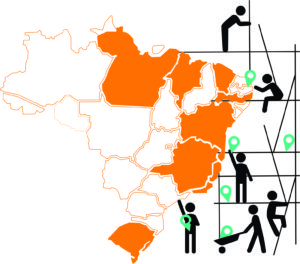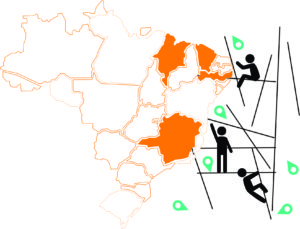In a scenario of systematic violations of human rights, countries need to address the structural issues that generate these situations. For this, complex public policies are needed, which are capable of interrupting situations of violence immediately, while acting in parallel to eliminate the situations that generate these violations.
The Brazilian State, recognizing the vulnerability and risk to which human rights defenders are exposed, has developed measures for the protection of these individuals and collectivities. However, there are numerous inefficiencies in the effectiveness of this protection policy in the country over the last few years. It is the role of the Brazilian Committee of Defenders to highlight the problems of this policy and charge for its full structuring and continuity.
The National Program for the Protection of Human Rights Defenders (PPDDH)

The National Program for the Protection of Human Rights Defenders (DPHR) in Brazil was instituted on October 26, 2004, based on human rights organizations’ demands for an effective public policy of protection and coping with the generating situations of threats to human rights defenders.
The implementation of the Programs in the states must take place through the formalization of agreements between SDH and the state governments. The agreements foresee the transfer of federal funds for the implementation of the state programs, which should also come with a financial contribution.
When the closure and discontinuity of the programs in the states occurs, protection is assumed by the Federal Program from its technical staff, based in Brasilia. The difficulty of the expansion is not due to the absence of protection demand, but rather by the lack of commitment of the federal states to offer a counterpart to the implementation of the PPDDH and / or the lack of political will to structure and maintain a policy like this.

Legal Milestone
The PPDDH never had a legal framework that made it a public state policy. Its existence, always at the mercy of the political will of the government in question, is constituted by means of a decree. There is a Law Project (PL) 4575/2009 that is being processed in the National Congress, and although it has already been approved by four commissions – Human Rights and Minorities (CDHM); Public Security and Combating Organized Crime, Finance and Taxation and Constitution and Justice (CCJ), is still stalled. The PL establishes which are the bodies responsible for the mechanism and their respective attributions, defines conceptually HRDs and the conditions for them to enter the program and discipline on the protective measures.
In April 2106, there was a recast of the decree that originated the mechanism and a new Decree (n° 8724) became effective. In the new formulation, the Deliberative Council of the mechanism no longer foresees the participation of civil society in the National Coordination of the Program. This decree brought critical changes that deteriorated the structure of the protection program because:
- a) restricted the scope of the PPDDH to persons in situations of threat, in opposition to OAS resolution 53/144 and the manual of procedures of the PPDDH, elaborated by the Secretariat of Human Rights (SDH) in partnership with civil society and other organs That protection of human rights defenders should occur to persons or groups at risk and vulnerability, not just people in situations of threat;
- b) creates the Deliberative Council of the PPDDH, but it foresees the participation of State organs, only, and excludes the participation of civil society, which from the beginning struggles for this space to be parity. According to the new composition, only two members of the Secretariat of Human Rights and one member of the Ministry of Justice would be part of the deliberative council. The decree ends with the national coordination of the PPDDH in its old molds, formerly composed of several public bodies and five civil society organizations.
Methodological Milestone
In a country with the dimensions of Brazil, the distancing of the federal PPDDH team from such diverse and complex realities leaves DDHs extremely fragile in the face of their menacing. The lack of protection strategies aimed at specific groups, in order to take into account their specificities, is one of the biggest problems of the mechanism. There are no measures aimed at women, the LGBT public, quilombolas (slavers) or indigenous people, for example, hit in singular ways. Thus, there is much to advance in a collectivized perspective of protection, after all when a leadership is threatened by a land conflict, the whole community is also. If the chieftain of a village is threatened, the whole village is also. It is impossible to ensure effective protection if all the people potentially involved in the conflict scenario are not considered and consistent methodologies are not created to ensure adequate protection of those specificities.
It is also essential that there be a specific treatment for women human rights defenders, as well as an extension of protection for women who are family members of the threatened leadership. When it comes to women human rights defenders it is important to consider that often the killer and menacing may be indoors. When women are placed on the political scene, it is very common that there is an increase in the violence they suffer within the domestic environment
Participation of civil society
Since 2004, organizations such as Global Justice, Land Rights, Indigenous Missionary Council, Commission Pastoral Land and National Human Rights Movement have integrated the National Coordination of the PPDDH, which had among its attributions to analyze cases of human rights in situations of vulnerability, Strategies for the protection and coping of structural issues, as well as deliberate in cases of inclusion and exclusion in the Program.
Organized civil society acted during all those years as the main agent for the improvement of PPDDH, pointing out its operational problems and elaborating recommendations aimed at its improvement. The proximity of these organizations to human rights defenders was also important in assessing how protection measures were put into practice.
The removal of civil society from the coordination of the PPDDH is viewed with great concern by the CBDDH. We believe that the structural problems that the mechanism faces will only be overcome taking into account the perspective of the actors who understand the need for a public policy of protection to defenders of human rights defenders who have been working for more than a decade to implement it.
The role of the State in the protection policy
One of the difficulties and challenges of protection policy, according to the CBDDH’s assessment, is the need for programs to articulate public organs responsible for guaranteeing rights – such as those in charge of land demarcation and indigenous rights, for example – and to mobilize public policies that address the structural issues that lead to the vulnerability of human rights defenders and social movements. The failure of the Brazilian State to confront problems such as not guaranteeing the right to land and land, aggravate agrarian conflicts and, consequently, puts human rights defenders in this context even more at risk, for example.
Another difficulty and challenge is the need for the threats to be properly investigated, leading to the accountability of actors who invest against human rights. In many of the contexts of defenders assisted by the mechanism, State agents appear as perpetrators of these violations, which means that the protection policy has to be further capillarized in several public organs of the State to be able to guarantee an effective protection of these victims.

